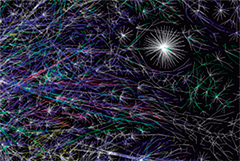News
FAPESP announces new call for eScience program Versão em português
 Collaborative proposals conducted by computer scientists and researchers in Agricultural Sciences will be received until July 2 (image: FAPESP)
Collaborative proposals conducted by computer scientists and researchers in Agricultural Sciences will be received until July 2 (image: FAPESP)
FAPESP announces the third call for proposals under its Research Program on eScience and Data Science.
The main goal of the program is to encourage bold, novel, and unconventional approaches to world-class multidisciplinary research and innovation involving joint collaboration of computer scientists and researchers in other fields.
This call is open to researchers associated to higher education and research institutions in the State of São Paulo and will receive proposals in e-Agriculture – collaborative research conducted by computer scientists and researchers in Agricultural Sciences.
Relevant topics include, but are not restricted to, the following topics:
-
Internet of Things and Agricultural Sciences;
-
Precision agriculture and precision farming (including vegetable and animal production);
-
Information technologies in fisheries and aquaculture;
-
Data Science for Agricultural Sciences;
-
Computational vision in Agricultural Sciences;
-
Embedded systems in agriculture;
-
Supply chains in the production and distribution of food;
-
Robotics and farms;
-
Connectivity in rural environments;
-
Design and development of sensors for rural applications;
-
Agriculture information systems;
-
Agribusiness and digital farms;
-
Geoinformatics for Agricultural Sciences;
-
Bioinformatics in Agricultural Sciences;
-
Human factors and interfaces for agronomical information systems.
Submissions will be received under the FAPESP’s schemes Regular Research Awards, Thematic Projects, Young Investigator Awards, and Innovative Research in Small Businesses (PIPE).
Proposals must be submitted through SAGe system, before July 2.
The total amount of resources for this call is R$ 8 million.
The call for proposals is available at www.fapesp.br/en/11680.
